






The National Science and Technology Forum (NSTF) held its prestigious annual NSTF-South32 Awards to honour and recognise outstanding South African contributions to the world of science, engineering and technology (SeT).
South Africa’s first science awards and dubbed the “Science Oscars”, the NSTF-South32 Awards marks the largest SeT and innovation awards in the country. The gala evening celebrating South African ingenuity and excellence took place on Thursday, July 11 and was live-streamed from Johannesburg and Cape Town.
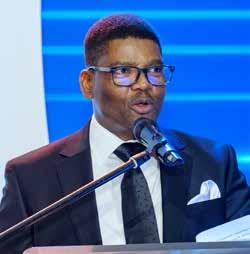
The NSTF Awards was established in 1998 as a collaborative effort to recognise teams, organisations and individuals who have made exceptional efforts in their fields.
“My view is that the future is bright and exciting, if we approach it with open minds and arms. The challenges faced by the world are profound. The threats of unprecedented outbreaks, natural disasters, climate change, drought, energy and

food insecurity, and so on remain priorities demanding the world’s attention and the need to work collaboratively and in partnership,” said Prof Jeffrey Mphahlele, NSTF Chairperson.
“Collectively, we are making progress. Science is at the heart of providing solutions to these myriad challenges. Amid these complexities, the NSTF continues to evolve and remain relevant. It always strives to be a moderate force that participates in public engagements and discourses with a view of shaping and influencing public policies for the benefit of society.
“The call is loud and clear – we need to build a society that looks into the future.”
Showcasing the research and development capacity of South Africa, the NSTF is the most representative multi-stakeholder non-profit forum promoting SeT and innovation.
The excellent outputs of the NSTF-South32 Awards winners support South Africa’s advancement, economic growth and the social upliftment of our people.
Content & Co-ordination: MaryAnne Isaac | Design: Stuart Senar | Editor: Linda Zakas
PrOFeSSOr Ben-erik van Wyk has spent decades unlocking the secrets of indigenous plants. his work in ethnobotany – the traditional uses of plants by local people – is situated at the nexus of cultural heritage and scientific inquiry. As the Chair of the Department of Science and Innovation (DSI)/National research Foundation (NrF) South African research Chairs Initiative (SArChI) in Indigenous Plant Use, Van Wyk’s work straddles the realms of botany, anthropology and cultural preservation. he is studying what he calls “the most ancient of human plant uses” and dealing with “accumulated wisdom about the properties of plants gained through hundreds of thousands of years of trial and error”.
As modernisation creeps into rural areas, traditional plant knowledge is fading fast. Van Wyk sees the urgency in preserving this fragile knowledge, which can easily be lost to future generations if not properly documented. “The botanical and cultural diversity of southern Africa is of importance to all humanity, as it is associated with the very origins of the use of plants by modern humans.”
By bridging ancient wisdom and modern science, Van Wyk’s research opens new avenues for drug discovery, sustainable agriculture and conservation. One of his most profound moments came during a visit to Nieuwoudtville, where an encounter with Koos Paulse, an elderly man of Khoi descent, led to a breakthrough in understanding the medicinal properties of Rafnia Amplexicaulis, which is used by elderly women as a natural hormone replacement therapy.
This collaboration, captured in a documentary, The Professor, exemplifies Van Wyk’s approach of elevating indigenous experts to their rightful place as co-researchers rather than subjects of study. his research has already nurtured several new intellectual leaders from various cultural groups, transforming ethnobotany from a “colonial safari-type adventure” to a dynamic, indigenous-led field.
Growing up in a family of “plant people” offered early exposure to the wonders of botany and set the stage for a lifetime of discovery. “My father was a keen gardener
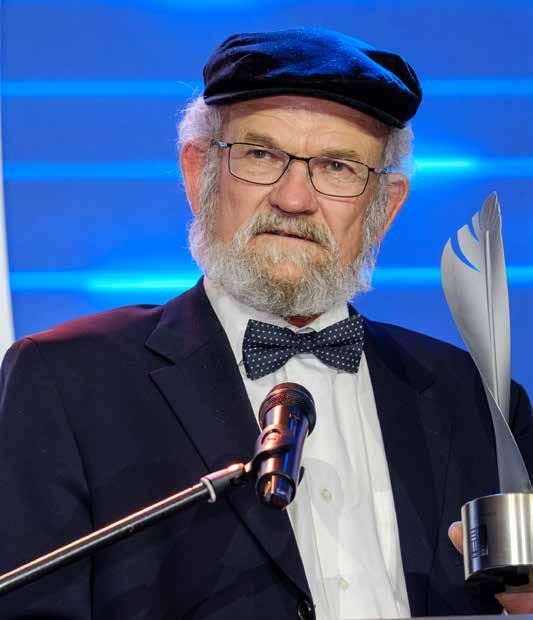
and my mother a botanical artist. So I practically knew all garden plants from an early age,” he recalls. “I learned that every leaf and every root holds a story; stories as old as humanity itself.”
For Van Wyk, the NSTF-South32 Lifetime Award is a validation of the long-term importance of his work and the profound discoveries associated with indigenous knowledge, which is often overlooked in the rush towards high-tech solutions. “It is not only species threatened with extinction, but also the indigenous knowledge associated with them.”




PrOFeSSOr Patience Mthunzi-Kufa, as research Group head for Biophotonics and Manager at the Photonics Centre at the Council for Scientific and Industrial research (CSIr) in South Africa, is harnessing the power of light to detect and combat some of the world’s most pressing health challenges. With her team, she is pushing boundaries to develop cutting edge photonics-based diagnostic devices that could transform point-of-care detection for hIV, tuberculosis, Covid-19 and various non-communicable diseases. “The diverse nature of the work I do drives my passion,” she says, explaining that the research itself is fresh, exciting and cutting edge.
her work represents more than just scientific advancement. It is a beacon of hope for improved healthcare accessibility, particularly in resource-limited settings where rapid, accurate diagnostics can make a life-saving difference.
She’s also pioneering photonics-based tools for bulk screening pharmaceuticals, which could prevent the distribution of substandard medication and potentially save millions of lives worldwide. “Drug safety, efficacy and availability are crucial areas of focus, because with reliable medications people can live long and fulfilled lives.”
her work is underpinned by curiosity and a desire to help others, and her constant probing and passion for problem-solving have led to numerous breakthroughs. “I love being in research because it is flexible, and its fluid nature provides opportunities to stretch oneself while making new discoveries.”
One of the most rewarding aspects of her work is witnessing the success of her students. “It is amazing when parents express gratitude and acknowledge my contribution to a student’s development, and it’s particularly exciting to see postgraduates under my supervision obtain their degrees Cum Laude.”
All research comes with challenges, but she emphasises the importance of stepping back when faced with complex situations. “The secret to obtaining these ‘Aha!’ moments is to take a breather.”
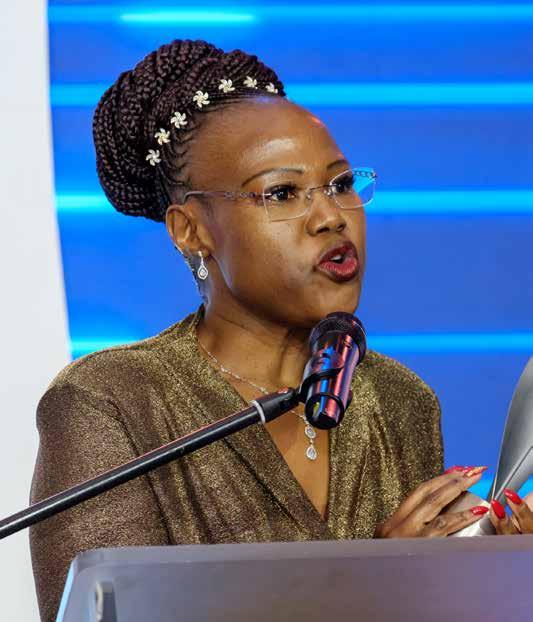
This professor dreams of starting an internationally renowned biophotonics spin-off company. The ambitious goal would serve the double purpose of creating jobs while applying cutting-edge research to various industries, including health, pharmaceuticals, agriculture and beauty.
Mthunzi-Kufa says winning the NSTF-South32 Award for a researcher is an amazing incentive to keep going the extra mile. “I’ve noted how much peer acknowledgement and international attention I’m attracting, which provides crucial strategic positioning for many opportunities going forward,” she says. “Winning also confirms that my family and research team are truly epic – I am because they are!”




Dr Tiisetso e Lephoto was one of two winners in the TW Kambule-NSTF Award: emerging researcher category.
A lecturer and Principal researcher in the School of Molecular and Cell Biology in the Faculty of Science at the University of the Witwatersrand (Wits), Lephoto won for her investigation of biological control agents (natural enemies for pests) which can help solve identified challenges and the identification of new insect-killing microscopic worms (entomopathogenic nematodes) that have the potential to infect and kill problematic soil-dwelling insects in farms within 24 to 48 hours of invasion.
Lephoto completed her PhD in microbiology and biotechnology at Wits at the age of 26. She is recognised as being among the youngest PhD graduates in the field of cell and molecular biology. She also holds an MBA from the University of reading and is the founder and Managing Director of Nematech Pty Ltd. This company provides holistic agricultural services, pest control solutions, soil sampling, genomics, data analysis and skills development. Through her Nematech Biosciences Foundation (supported by the Department of Science and Innovation), Lephoto provides mentorship to more than 200 graduates. A self-described innovator and entrepreneur, the accolades of this multi-award-winning scientist and researcher include Best Young Woman in Science and Technology (2018), Wits University’s Faculty of health Sciences’ honorary Award (2017), and the National research Foundation’s excellence in Science engagement Award (2017), among many others.
Lephoto says, “Winning the NSTF-South32 award means a lot to me. I am particularly grateful to my mum and dad for supporting my love for science at the tender age of five. I am filled with gratitude for the countless sacrifices they’ve made, the endless hours they’ve spent

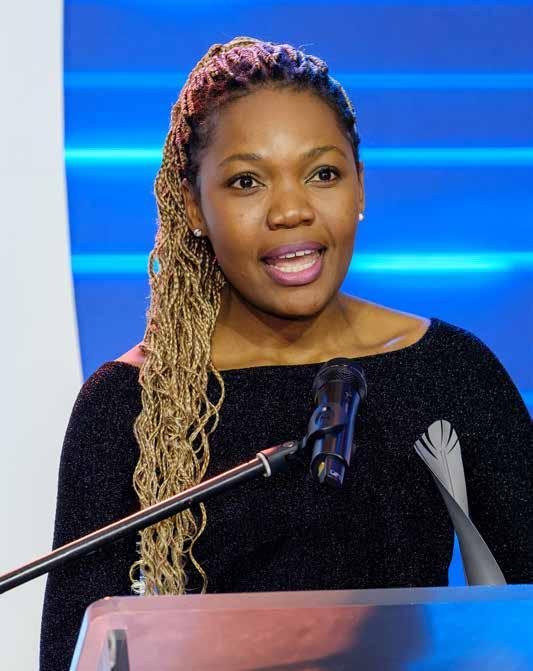
encouraging me, and for the unconditional love that has sustained me through it all. To all the young scientists out there and to the over 400 mentees I am mentoring: never under-estimate the power of your potential.”



PrOFeSSOr Tebogo Mashifana, at the helm of the Department of Chemical engineering Technology at the University of Johannesburg (UJ), is revolutionising how industrial waste is viewed and treated, while reshaping the landscape of environmental engineering in South Africa and beyond.
“I convert industrial pollutants into new, usable products and employ waste-based solutions for wastewater treatment, aiming for zero waste discharge. We aren’t just managing waste; we’re transforming it into valuable resources.”
Mashifana first witnessed the environmental toll of industrial waste as a graduate metallurgist working in South Africa’s gold mining industry – an experience that ignited a passion that would define her career and solidify her commitment to practical, circular economy solutions. her work has yielded remarkable real-world results, including a provisional patent for using modified waste materials as a substitute for conventional binding agents like cement. her novel waste-to-material approach transforms various waste streams into building materials such as paving blocks, roof tiles and bricks.
“Furthermore, the reliance on locally available waste reduces the need for imported supplies, fostering self-reliance and resilience,” she explains. “Ultimately, this research has the power to advance waste processing technologies, promote sustainable construction practices and contribute solutions to critical housing challenges in SA.”
Looking ahead, Mashifana is excited about the possibilities in sustainable materials, waste beneficiation and knowledge transfer. She’s particularly intrigued by the potential of 3D printing using waste materials, and advancing electronic waste beneficiation. “Prioritising the commercialisation of research findings can lead to job creation and economic development, addressing pressing challenges in SA and the globe. By targeting these multifaceted areas, we can drive transformative advancements in sustainability and create tangible societal impact.”
As she accepts the TW Kambule-NSTF emerging researcher Award, Mashifana remains grounded in her guiding principle to “leave every space better” than she

found it – and to do so with creativity, persistence and patience.
“Pursuing this type of groundbreaking research has taught me the importance of high-quality work and unwavering determination to pave the way for progress, even in the face of adversity.
“This award inspires me to continue pushing the boundaries of innovation, and it is a career-defining achievement that I embrace with great humility.”
To emerging researchers, Mashifana offers a powerful call to action: “Be deeply bothered by the pressing challenges facing our society. Let what keeps you awake at night drive you to investigate innovative solutions.”




AS the Director of the Forestry and Agricultural Biotechnology Institute (FABI) and Innovation Africa and a professor at the University of Pretoria (UP), Professor Bernard Slippers’ mission is to nurture the next generation of researchers and foster scientific excellence through team-based research.
While he is redefining leadership in the scientific community, he believes: “Science and innovation are not the result of a brilliant moment and a brilliant person; it is always an emergent property of an ecosystem in which people work.”
exploring Namibia’s diverse landscapes while he was growing up, Slippers developed a deep fascination with nature and biological diversity. An early passion for everything – “from the sea to the desert, to mushrooms on termite mounds in the Savanna” – was nurtured by his parents, who were both teachers. This led to a career dedicated to not just scientific discovery, but also to building the structures that make groundbreaking research possible. his leadership philosophy emphasises the power of teamwork over mere collaboration. “Collaboration is two athletes running 100m next to each other. Teamwork is like competing for the World Cup and relies on different skills; everyone depends on one another to do their unique part.”
Despite resource challenges in South Africa’s scientific landscape, this approach has been instrumental in FABI’s global competitiveness for over 25 years. Under Slippers’ guidance, the institute collaborates with industry and government, ensuring a real-world impact by bridging the gap between academic research and practical applications – particularly in the forestry and agricultural sectors. recognising the importance of leadership development in science, Slippers encourages young scientists to develop crucial soft skills such as teamwork, communication, problem-solving, emotional intelligence and collective leadership.
“While expecting scientists to help build our organisations and change our world, we are not intentional enough in developing key skills beyond technical work,”
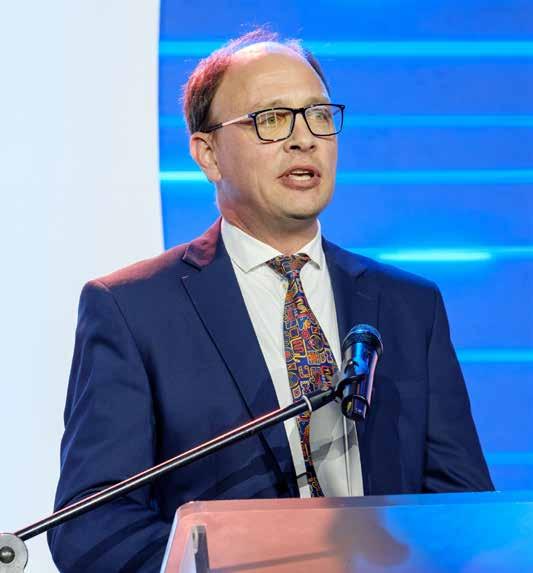
he explains.
This belief was reinforced by his involvement with the Global Young Academy.
“If we want to close the gap between the haves and the have-nots, we must be intentional and build strong, stable platforms and ecosystems for our future generations to work in.”
As he celebrates this recognition, Slippers again acknowledges that scientific leadership is not about individual brilliance.
“I have the best job in the world and this award is a testament to the hard work and dedication of the entire FABI team. This award stems from the ecosystem we’ve built together, where collective excellence can flourish.”






LOOKING to shape a brighter future? Look no further than the Durban University of Technology (DUT), a globally recognised institution that stands at the forefront of higher education, technological training, research, entrepreneurship and innovation. For those considering their preferred university for 2025, DUT is the perfect choice.
Situated in KwaZulu-Natal, DUT boasts seven strategically located campuses in Durban and Pietermaritzburg. The university offers six faculties covering a diverse range of disciplines, including Accounting and Informatics, Applied Sciences, Management Sciences, engineering and the Built environment, health Sciences, and Arts and Design. With 20 diverse research focus areas, DUT actively promotes cutting-edge research aimed at addressing real-world challenges.
DUT’s success extends beyond academic achievements, emphasising holistic development and entrepreneurship. The Faculty of Management Sciences hosts the DUT Business School, which focuses on applied business practices, equipping future leaders with the skills to drive socio-economic transformation. embedded in DUT’s essence is the eNVISION2030 strategy, instituted in 2020. This framework, deeply rooted in core values of transparency, honesty, integrity, respect and accountability along with the principles of fairness, professionalism, commitment, compassion and excellence, forms the foundation of the institution. The university’s tagline – “CreATIVe. DISTINCTIVe. IMPACTFUL.” – promises students not just an education, but a holistic experience. Those propelled by a quest for knowledge, a thirst for technological training or an entrepreneurial spirit will find DUT an unmatched pedestal. It is not just an academic establishment; it’s a community committed to innovation, entrepreneurship – and above all, shaping individuals ready to leave an indelible mark on the world.
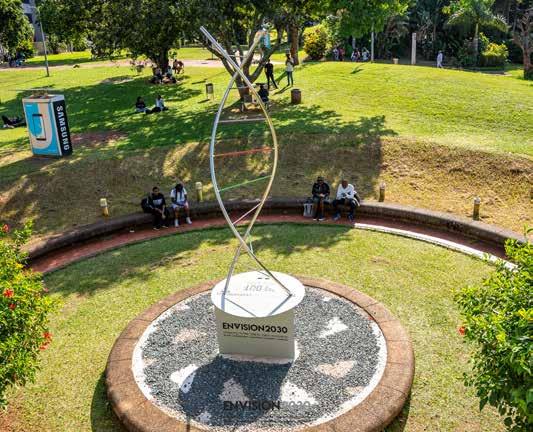
For those with an entrepreneurial spirit, DUT offers the innobiz DUT Centre for entrepreneurship and Innovation. This centre provides both practical and theoretical entrepreneurial learning opportunities aimed at producing innovative, problem-solving entrepreneurs ready to make a positive impact on society.
Make DUT your preferred university of choice and embark on a transformative educational journey that nurtures your potential and prepares you to make a positive impact on the world. Dare to dream big and choose DUT as your academic home for a future full of possibilities. With undergraduate and postgraduate applications currently open, aspiring scholars have a wide array of programmes to choose from, tailored to their passions and career goals.
For comprehensive information on DUT’s programme offerings, admission requirements and application procedures, visit www.dut.ac.za
DUT eNVISION2030… CreATIVe. DISTINCTIVe IMPACTFUL.

DUT congratulates all the winners of the 2023/2024 NSTF-South32 Awards, as well as the three DUT researchers who were finalists: Dr Emmanuel Kweinor Tetteh, Professor Ajay Mishra, and Professor Saheed Sabiu.
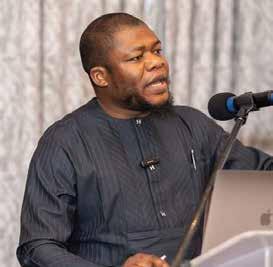
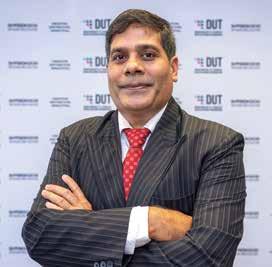
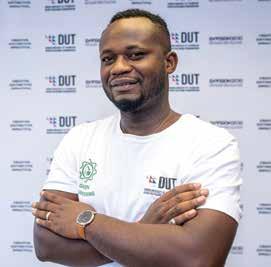
Dr Emmanuel Kweinor Tetteh, a Research Fellow and Principal Investigator with the Green Engineering Research Group (GERG); Professor Ajay Mishra, a Professor in the Department of Chemistry; and Professor Saheed Sabiu, an Associate Professor in the Department of Biotechnology and Food Science, were recognised amongst other individuals or organisations for their outstanding contributions to science, engineering, technology (SET), and innovation across 14 different categories.
Dr Tetteh and Professor Sabiu were nominated in the TW Kambule-NSTF Award: Emerging Researcher category, which honours individuals for up to six years of research work in South Africa. Meanwhile, Professor Mishra was nominated in the NSTF-Water Research Commission Award category, which recognises leadership and impact in sustainable water management over the last five to 10 years.
Professor Sabiu, who leads the Computational and Systems Biology Research Group, focuses on bioprospecting for therapeutic targets against degenerative and microbial diseases. He expressed elation and humility upon being named a finalist, emphasising the importance of such awards in highlighting relevant research at DUT.



In 2023, Professor Sabiu had already received accolades at the DUT ENVISION2030 Institutional Awards, including Faculty Researcher of the Year (Gold) and Emerging Researcher of the Year.
Professor Mishra described the NSTF Awards as pivotal in representing scientific achievement with pride, while Dr Tetteh credited his nomination to his significant contributions in SET and innovation in South Africa, underscoring the recognition of his hard work and dedication.



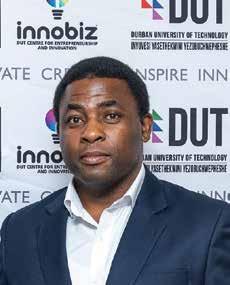
The Deputy Vice-Chancellor, Research, Innovation, and Engagement at DUT, Professor Fulufhelo Nemavhola, extends congratulations to the finalists, highlighting their exceptional contributions and the university's commitment to impactful research and innovation.







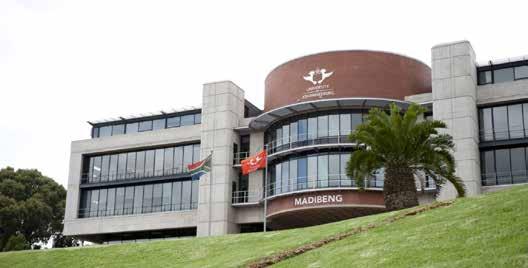
The University of Johannesburg (UJ) has consolidated its position among the leading institutions of higher learning in South Africa and on the African continent.
UJ has soared to its highest global ranking in the Times higher education (The) Impact rankings released in May this year – securing a remarkable 36th position. This is quite a feat, considering that this year’s rankings included 1 963 institutions, which is an increase of 372 from the previous year.
The university’s standing in these global rankings marks a significant rise of 10 from its previous position of 46th in the 2023 edition. Consistently leading as the top university in Africa and South Africa, UJ maintains its prestigious number one spot on the continent and in the country.
In addition, UJ has again been recognised as the leading institution in South Africa and Africa for its exceptional contributions to poverty alleviation –securing the top position in Sustainable Development Goal (SDG) 1: No Poverty. UJ now ranks third globally in the SDG category; highlighting its firm commitment to research and support initiatives aimed at assisting impoverished students and local communities.
This notable achievement highlights UJ’s dedication to addressing some of the world’s most critical challenges, including environmental sustainability, social inclusion, economic growth and collaborative partnerships.


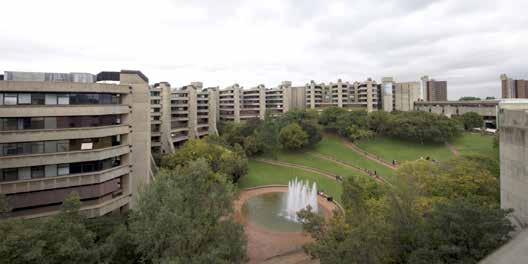
UJ’s performance across individual SDGs is commendable, achieving top 100 rankings in six SDGs:
#3 for SDG 1: No Poverty
#6 for SDG 8: Decent Work and economic Growth
#13 for SDG 5: Gender equality
#46 for SDG 10: reduced Inequalities
#53 for SDG 4: Quality education
#93 for SDG 2: Zero hunger
Apart from its impressive The Impact ranking showing, UJ also continues its strong performance in the QS World University rankings – maintaining its position among the top 350 globally. UJ is also recognised as the most improved African institution over the past five years.
“This recognition of UJ in the various global rankings highlights the university’s rapid growth and outstanding potential in the global academic arena. Despite its relatively short history of 20 years of existence, UJ has demonstrated exceptional progress – challenging well-established institutions, some of which have more than a century of legacy,” says Letlhokwa George Mpedi, UJ vice-chancellor and principal.
“The university remains steadfast in its commitment to addressing societal challenges through research and knowledge production. Our progress is not just about numbers and figures; it’s all about the positive and lasting impact we have on our students and broader society.”

We are delighted to extend our heartfelt congratulations to our researchers for achieving remarkable success at the National Science and Technology Forum (NSTF) Awards held recently.
The prestigious recognition of two individual awards and one group award underscores the exceptional contributions of the University of the Western Cape’s research community. Special accolades go to Professor Timothy Dube, Director of the Institute for Water Studies, and Professor emmanuel Iwuoha, SArChI Chair for Nanoelectrochemistry and Sensor Technology, for their outstanding accomplishments. Your innovative research not only advances scientific knowledge, but also plays a pivotal role in addressing critical global challenges.
The 26th annual NSTF-South32 Awards, known as the “Science Oscars of South Africa”, are the largest, most comprehensive and most coveted national recognition in the field. They honour outstanding contributions to science, engineering, technology (SeT) and innovation by individuals, teams and organisations across South Africa. The categories span a diverse range, including experienced scientists, engineers, clinician scientists, innovators, science communicators, engineering capacity developers, research managers and data curators. Now the awards have been expanded to include science diplomacy.
The “Science Oscars” winners from UWC are:
¡ Prof Timothy Dube, Director of the Institute for Water Studies, who was honoured with the NSTF-Water research Commission Award for his pioneering and innovative methods using satellite technology merged with machine learning (AI) to monitor water resources in semi-arid regions. his work significantly enhances ecological sustainability and community resilience.
¡ Prof emmanuel Iwuoha, SArChI Chair for Nanoelectrochemistry and Sensor Technology, who received the engineering research Capacity Development Award for his groundbreaking research on disease diagnostic sensor devices, lithium-ion battery/supercapacitors and solar cell


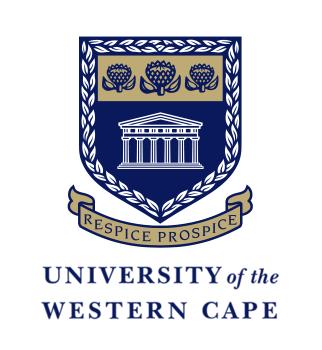
technology. his leadership at UWC’s SensorLab has fostered significant advancements in these critical areas.
¡ Inter-University Institute for Data Intensive Astronomy (IDIA), a collaborative effort between UWC, the University of Cape Town (UCT) and the University of Pretoria (UP), won the Special Annual Theme Award for their cutting-edge infrastructure and management, facilitating global collaboration in astronomy. This initiative empowers researchers to analyse complex SeT data with unprecedented efficiency.
Your dedication to excellence and innovation is a testament to how UWC is making research count in meaningful ways. Congratulations once again to all the nominees, award winners and the UWC community. Your achievements inspire us all and demonstrate the profound impact that dedicated research and innovation can have on our society and our planet.
Professor José Frantz Deputy Vice-Chancellor: research & Innovation
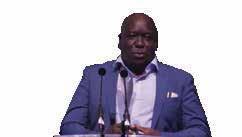
Prof. Timothy Dube, Director of the Institute for Water Studies, who was honoured with the NSTF-Water Research Commission Award for his pioneering and innovative methods using satellite technology merged with machine learning (AI) to monitor water resources in semi-arid regions. His work significantly enhances ecological sustainability and community resilience.
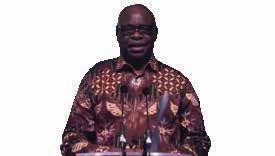
Prof. Emmanuel Iwuoha, SARChI Chair for NanoElectrochemistry and Sensor Technology, who received the Engineering Research Capacity Development Award for his ground-breaking research on disease diagnostic sensor devices, lithium-ion battery/supercapacitors, and solar cell technology. His leadership at UWC's SensorLab has fostered significant advancements in these critical areas.
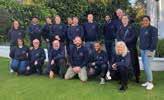
Inter-University Institute for Data Intensive Astronomy (IDIA), a collaborative effort between UWC, the University of Cape Town (UCT), and the University of Pretoria (UP), won the Special Annual Theme Award for their cutting-edge infrastructure and management, facilitating global collaboration in astronomy. This initiative empowers researchers to analyse complex SET data with unprecedented efficiency.
(Sponsor: Eskom)
PrOFeSSOr Claudia Polese was one of two winners in the NSTF-South32 Awards engineering research Capacity Development category.
An Associate Professor in Aerospace Manufacturing and Design, and head of the Aeronautical engineering Stream in the School of Mechanical, Industrial and Aeronautical engineering at the University of the Witwatersrand (Wits) since 2009, Polese is also Advisory Aerospace research Director at Wits’ National Aerospace Centre.
Polese was awarded for her leadership of several strategic South African initiatives to strengthen the research in advanced manufacturing technologies, and primarily the innovative Laser Shock Peening (LSP) process – furthering substantial infrastructural and human capital development. Polese established the SA LSP Initiative in 2012, which in a few years expanded into a substantial human capital and infrastructure development.
“An amazing part of my work has been to be constantly involved in the innovation space, with the creation of a fast-growing, young, diverse team and a local multidisciplinary network of researchers that allowed me to foster industrial and scientific co-operation between South Africa and other countries,” says Polese, who is also Deputy Director of the African research Universities Alliance (ArUA) Centre of excellence in Materials, energy and Nanotechnology.
Polese is an Italian professional engineer, whose MSc in Aeronautical engineering (specialising in Aeronautical Structures) laid the foundations of her knowledge of materials testing and Finite element modelling. her PhD in Conventional and Innovative Aerospace Joining Technologies, from the Department of Aerospace engineering,
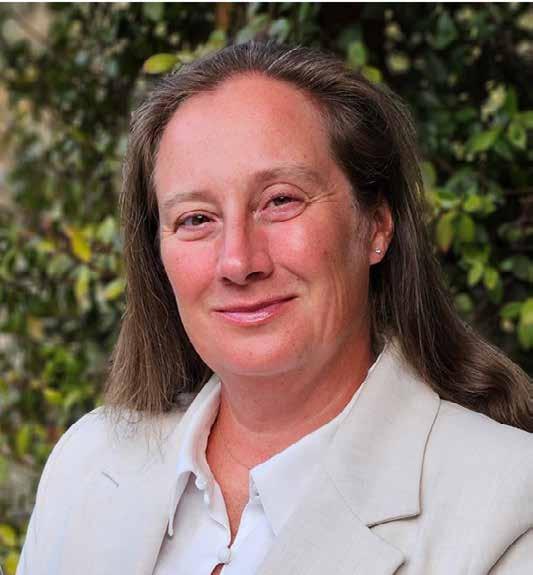
Pisa and the German Aerospace Center, Cologne, used theoretical and experimental methods synergistically to increase understanding of fatigue phenomena and enhancing technologies that can drastically affect aircraft’s operative life.
A National research Foundation B-rated researcher, Polese is a Fellow of the royal Aeronautical Society and was nominated for Knight of the Order of the Star of Italy in 2023. Among many other accolades, she received Wits University’s Faculty of engineering and the Built environment’s Postgraduate Supervision Award in 2018.
“The most fulfilling experience has been seeing my students grow into well-rounded individuals, great engineers and researchers, and who achieved prizes and awards, graduated with their MSc and PhD degrees and made their mark in research centres and industries globally. Therefore I am honoured to receive the NSTF-South32 Award. It feels like a wonderful recognition of the effort spent supporting and growing the next generation of South African engineers, with a substantial impact on the country’s knowledge-based economy,” Polese says.




(Sponsor: Eskom)
PrOFeSSOr emmanuel Iwuoha and his team have developed ultra-sensitive biosensors for detecting breast cancer, TB and myocardial infarctions – potentially revolutionising patient care in resource-limited settings.
“These diagnostic sensors are easy-to-use analytical devices, suitable for point of need applications in clinical diagnosis,” explains the University of the Western Cape’s (UWC) distinguished chemistry professor.
“They are necessary for obtaining real-time information required for patient management at hospitals and doctor’s clinics.”
Prof Iwuoha is the Chair of the DSI/NrF South African research Chair Initiative (SArChI) for Nanoelectrochemistry and Sensor Technology. At a doctoral level, he has created rare competencies in areas such as disease diagnostic biosensors, electrochemiluminescence, photovoltaic solar cells and lithiumion battery materials. his research also involves creating functional materials from sustainable resources like solar cells, batteries and super-capacitors for use in sensors and clean energy generation.
his contribution to research capacity development is best exemplified by UWC’s Sensor Laboratories (SensorLab), which he founded in 2002. What began with one MSc student in a small laboratory has become a centre of excellence comprising 11 state-of-the-art laboratories, 65 postgraduate students and 12 academic staff members.
Over the past two decades, the facilities have enabled the training of more than 200 postgraduate students and postdoctoral fellows. This organic growth served as an incentive for the construction of the ultra-modern Chemical Sciences Building at UWC, which houses SensorLab on its fourth floor.
Iwuoha’s impact extends beyond academia. One of his goals is to use nanoelectrochemical technology to improve the quality of life in rural African communities by developing low-cost solar cells and disease diagnostic tests, underscoring his commitment to translating cutting-edge research into practical solutions.
“I’ve always been driven to find ways that could benefit humanity or offer solutions to real-world problems,
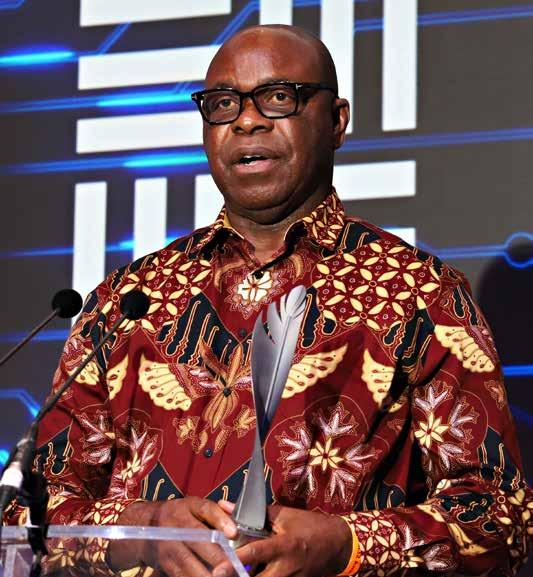
particularly in the field of human health,” he says, adding that he is excited about the integration of AI in sensing technology, energy generation and storage.
recognised as an A-rated scientist by the National research Foundation (NrF) and an honorary Fellow of the royal Society of Chemistry, Iwuoha emphasises the importance of developing adequate research facilities.
“Aspiring researchers should aim for adequate research infrastructure and laboratories suitable for in-house implementation of research plans,” he advises.
Prof Iwuoha has been honoured with the NSTFSouth32 engineering research Capacity Development Award – recognising that his work pushes boundaries in functional materials and nanoelectrochemistry, while fostering a new generation of researchers and innovators.




AT the nexus of hydrology and cutting-edge technology, Professor Timothy Dube leverages the power of artificial intelligence (AI), machine learning and remote sensing to address one of humanity’s most pressing challenges –water scarcity.
his innovative approach is transforming how water resources are monitored, analysed and managed in some of the world’s most vulnerable ecosystems, with remarkable accuracy.
“Technological advancements enable us to respond to environmental changes in real time, optimise water usage and develop predictive models for better resource planning,” Prof Dube explains.
Prof Dube, Director of the Institute for Water Studies at the University of the Western Cape (UWC), is particularly interested in the often overlooked non-perennial rivers (N-Prs) of semi-arid regions. In sub-Saharan Africa, twothirds of rivers are non-perennial, meaning they do not flow all-year round. These intermittent waterways have been historically neglected in research – a problem in an era where climate change threatens local and global water security.
During a field project as an undergraduate student, Dube saw the devastating effects of water scarcity on rural communities. “Witnessing the struggles people faced due to limited access to clean water profoundly impacted me.”
The model developed by Dube and his team estimates water availability within N-Prs with approximately 85% accuracy – a significant development in regions where traditional monitoring methods fall short. “Our goal is to provide decision-makers with the most accurate and up-to-date information possible.
“By harnessing new-generation Sentinel satellite data, we’re able to detect and monitor water resources in ways that were previously impossible; addressing pressing environmental challenges and promoting better water resource management.”
Dube’s work directly informs improved water management practices and supports agricultural planning, drought mitigation and ecosystem conservation. “The
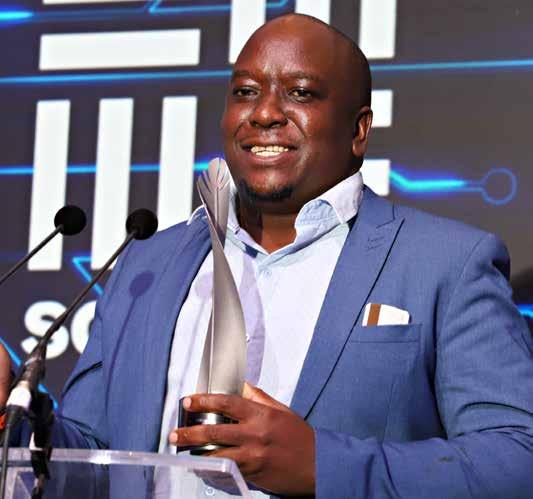
success of this project was technical, but also deeply personal. Witnessing the direct impact of our work on the ground and knowing that our research was contributing to resilient water management practices and resilient communities was profound.”
As a passionate educator, Prof Dube has trained more than 20 postgraduate students in these advanced technologies, nurturing the next generation of water resource experts. “The integration of AI and machine learning into hydrological modelling presents exciting opportunities to improve predictive capabilities and optimise water management strategies.”
Dube says winning the NSTF-Water research Commission (WrC) Award offers more than personal recognition. “It highlights the importance of inter-disciplinary research in addressing complex environmental issues – amplifying its influence and fostering the broader adoption of innovative solutions to global water challenges.”




(Sponsor: South African Medical Research Council)
A NePhrOLOGIST and lecturer in the Department of Internal Medicine in the University of the Witwatersrand (Wits) School of Clinical Medicine, and research Director at the Wits Donald Gordon Medical Centre, Dr June Fabian’s NSTF-SAMrC Clinician-Scientist Award recognises her leadership and co-ordination of the multi-country African research on Kidney Disease (ArK) project.
The ArK project findings challenged outdated, biased and unscientific diagnostic tools – and developed innovative, evidence-grounded methodologies to achieve greater impact in the early detection and management of chronic kidney disease in African populations.
“Kidney disease in Africa remains silent, deadly and misunderstood. To change this, we must develop a strong sustainable network of research excellence in Africa, inform policy that promotes screening and early detection of those with kidney disease, and advocate for access to amazing new drugs that can prevent progression of kidney disease, many of which are coming off patent in the next few years,” Fabian explains.
Fabian is a Wits alumna who first qualified as a pharmacist and transitioned to study medicine. She trained as a physician and then as a nephrologist, and began practicing at the height of the hIV epidemic when there was no access to ArT. Immersed in the epidemic and recognising the need for local data to inform decision-making – such as who to dialyse or not – catalysed her research career, which was initially focused on hIV-associated kidney disease. her doctoral work expanded to understanding the epidemiology of kidney disease in African populations, notably through the ArK project.
Fabian has led the ArK study in South Africa since 2016. She works among rural communities in the Bushbuckridge sub-district of Mpumalanga, where she is integral to the clinical platform team at Wits’ rural campus, officially the SAMrC/Wits rural Public health and health Transitions research Unit (Wits-Agincourt).
“I hope to contribute research that accurately rep-

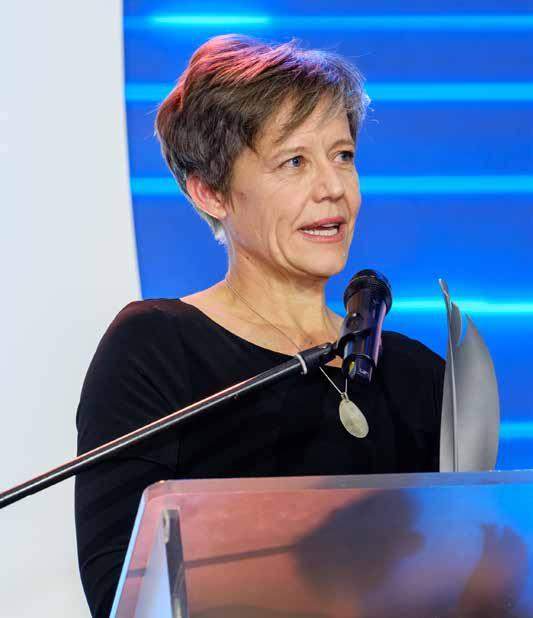
resents African populations in global science, redresses inequities, and improves human life and the care we provide in Africa and more broadly. I am deeply committed to capacitating the next generation of African scientists to ensure the longevity and expansion of African-centric research programmes,” she says.
“I hope that winning the NSTF-South32 award will help me progress in my career, enhance my credibility and mostly, help me to procure funding and develop collaborations and networks that enable me to do more research that makes a difference, for which I am deeply grateful.”



AS sustainability continues to become a global priority, Professor Linda Godfrey is a pioneering force in circular economy innovation – reshaping how South Africa views its resources and waste.
“Approximately 50% of climate impacts, 90% of biodiversity loss and 90% of water stress comes from the extraction and processing of resources. If we are to address the big planetary crisis facing us, we must rethink our relationship with resources,” Godfrey says.
Godfrey is the Manager of Circular Innovation South Africa (CISA), an initiative of the Department of Science and Innovation (DSI), managed by the Council for Scientific and Industrial research (CSIr). Through CISA, Godfrey implements the DSI’s science, technology and innovation aspirations in the circular economy and leads the charge in transforming the country’s approach to resource use.
She’s guided by two decades of experience in the waste sector. “I’ve seen first-hand how as a society we consume and dispose, and just how much of our waste ends up in landfills or dumpsites,” she reflects.
She says SA has the unique opportunity to leapfrog the resource-intensive growth paths of the global north “to understand the opportunities and constraints provided by our limited resources, and create a more sustainable and regenerative trajectory that provides improved quality of life for all”.
The country already has many examples of circular practices in place. “Perhaps not yet at the scale for meaningful impact, but they’re there. We’ve been doing ‘circular’ for decades; we just never called it that.”
recent developments in this field filled her with excitement and hope. “We’re seeing circular businesses and business models emerge that we would never have dreamt of a decade ago. New policy instruments and innovative new technologies support the efficient and sufficient use of resources, and are decoupling development from resource consumption,” she adds.
Godfrey wears multiple hats – manager, researcher and teacher – and remains committed to a sustainable future.
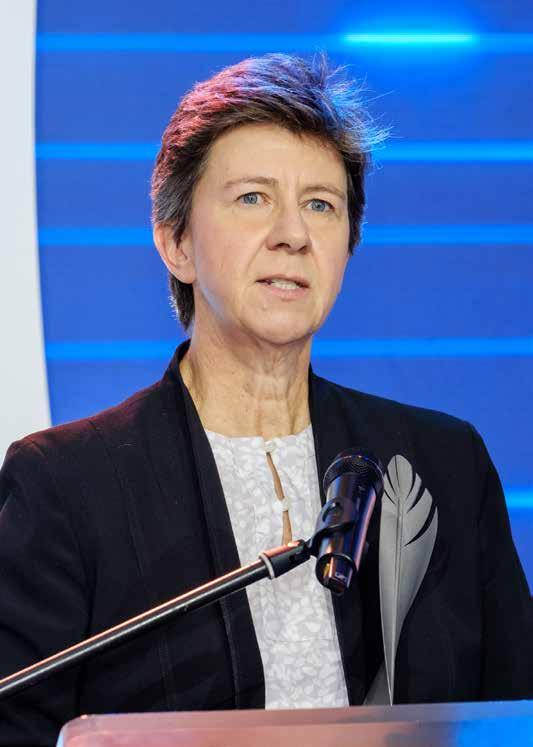
“Professional success is about making a positive difference, a continuous cycle of learning, sharing and building, impacting how SA manages its resources, including waste.”
Winning the NSTF-South32 Green economy Award holds special meaning. “recognition from peers suggests the work we do has an impact, and also acknowledges the long hours and sacrifices that one makes to build a lasting career in the sciences.”




AN honorary Adjunct Professor in the School of Mechanical, Industrial and Aeronautical engineering at the University of the Witwatersrand (Wits), Irvy “Igle” Gledhill won the Science Diplomacy for Africa Award, which recognises impactful solutions and/or collaborations for the benefit of South Africa and the African continent.
Gledhill was awarded the accolade for her work to build vibrant, supportive environments in which women and men as scientists can make real contributions. “Scientists and engineers do find a way across political boundaries, because of their overriding common interest in solving challenging problems,” she says.
her leadership contributions include the international Women in Physics working group, the Global Gender Gap Project and convening African and South African scientists to engage with “wicked” problems.
“I’d like to state clearly that science is not a belief system; it’s a process of questions, reasoning and testing. Bias and illusion are quickly discarded. Science is a process of continuous exploration and challenge,” says Gledhill.
Gledhill was born in Makhanda, in the eastern Cape province. She completed her BSc with distinction in physics in 1976, followed by an honours degree in Physics at rhodes University. She completed her PhD in Plasma Physics at the University of Natal (now UKZN). She did her postdoctoral work at the University of California, Los Angeles, on magnetic confinement and plasma simulation, and at Stanford on Space Shuttle physics.
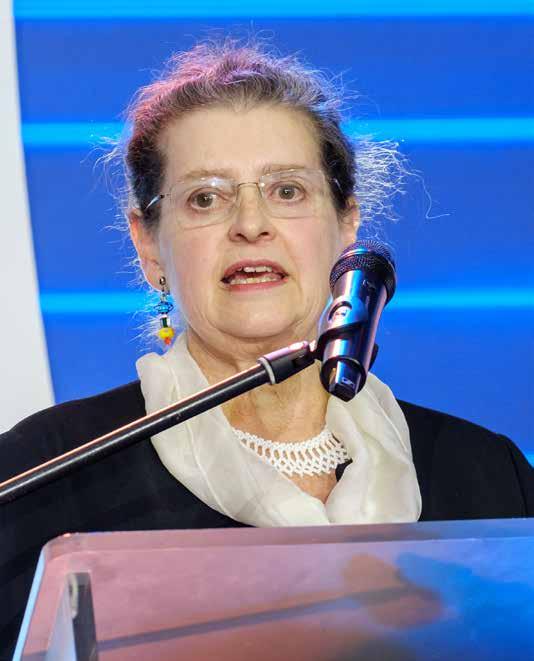
In 2024, rhodes University awarded her a DSc (honoris causa) for her “long and distinguished contribution to research in physics, national and international leadership in physics, and human capital development, particularly regarding women in physics”.
She is Vice-President for International relations and Scientific Affairs of the Network of African Science Academies, interim Vice-President of the Academy of Science of South Africa, and a member of the American Physical Society Committee on International Scientific Affairs. She serves on the SA-UNeSCO Science Sector Committee and the World Cultural Council Interdisciplinary Committee.
“Science diplomacy across Africa is more important than ever before,” says Gledhill. “We are the continent most vulnerable to climate change and we are in the crisis now. Crops are failing. Floods and heatwaves are more frequent. Displacement and migration are rising. We are sounding the warning now: it’s time to adapt and prepare.”




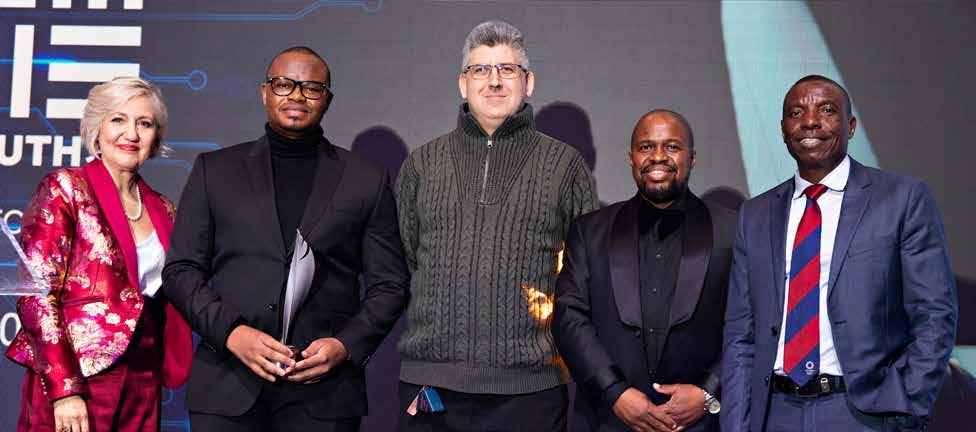
The NSTF-South32 Data for research Award was awarded to the uLwazi Node for the SAeON Open Data Platform (ODP).
The award category is granted for advancing the availability, management and re-use of research data.
The SAeON ODP, which is managed by the uLwazi Node, is a metadata repository / data infrastructure that facilitates the FAIr (Findable, Accessible, Interoperable, reusable) publication, discovery, dissemination and preservation of earth observation and environmental data in South Africa.
Portions of the ODP metadata are visible in the Global earth Observation System of Systems (GeOSS) and DataCite. The system also supports national data mobilisation initiatives, including the South African risk and Vulnerability Atlas and the Marine Information Management System, which is co-developed with the Department of Forestry, Fisheries and the environment.
uLwazi, meaning “knowledge”, is one of SAeON’s

seven nodes and was established in 2018 to support data management, the development of information platforms and decision-support tools for government departments. It is comprised of four areas co-ordinated by specialist team leaders in IT infrastructure, data curation, systems development and data science.
Last year, the SAeON ODP was certified as a Trustworthy Data repository by the CoreTrustSeal Standards and Certification Board. This was the result of years of work by the uLwazi Node to ensure that the SAeON ODP was set up and run according to international standards, and led to the SAeON ODP being only the second repository on the African continent to receive the certification. The work put into achieving this certification laid a solid foundation for the SAeON ODP.
* SAEON = South African Environmental Observation Network



The Nuclear Medicine research Infrastructure (NuMerI) represents a paradigm shift in patient care and stands as a testament to South Africa’s cutting-edge scientific prowess.
“We offer a one-stop shop medical imaging and theragnostics facility that is dedicated to drug development and clinical research,” explains NuMerI CeO Professor Mike Sathekge, a renowned nuclear medicine physician.
What sets NuMerI apart is its comprehensive approach, which synergises preclinical imaging, radiopharmaceutical production, translational research, radiobiology, medical physics, clinical molecular imaging and theragnostics under one roof. Theragnostics is a two-pronged approach that uses imaging technologies and targeted therapies to identify and treat diseases like cancer, while also monitoring patient outcomes.
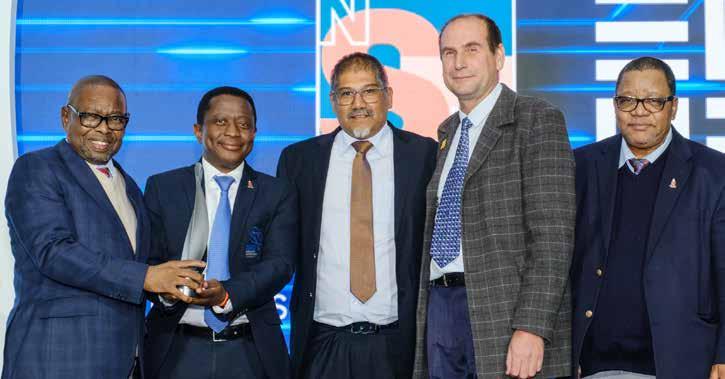
and meticulous project execution. “This required a continuous pour of a specially designed high-density concrete from 80 cement trucks,” Sathekge recalls.

This integration creates a unique ecosystem that spans from “laboratory bench to patient bedside”, adds Prof Sathekge.
NuMerI’s groundbreaking work on prostate cancer treatment using targeted alpha therapy has garnered international recognition and prolonged the lives of patients from all walks of life. “All this research has culminated in a publication earlier this year in The Lancet, one of the top medical journals in the world.”
Sathekge says the establishment of NuMerI also represents a triumph of collaboration, bringing together national partners like NeCSA/NTP, iThemba LABS, the University of Pretoria and Steve Biko Academic hospital. This partnership leverages diverse strengths to benefit patients, students, researchers and the broader economy.
The facility was built on the roof of Steve Biko Academic hospital, demanding high-level engineering design
Despite facing challenges in securing funding and overcoming stigmas associated with nuclear medicine, NuMerI has persevered.
Sathekge is optimistic about the field’s potential. “The field of Nuclear Medicine and radiopharmacy is afoot globally, and NuMerI is perfectly positioned at just the right time during the upswing in the industry.”
receiving the NSTF-South32 Award for Innovation through a Corporate Organisation for its contribution to medical research and patient care is not just about recognition. “It gives the public a glimpse of work that has the potential to change their lives within the next decade.”
NuMerI will continue to push the boundaries of nuclear medicine research and application. This award therefore serves as a reminder of SA’s growing role in global medical innovation and its potential to develop affordable, cutting-edge healthcare solutions for its population and beyond.



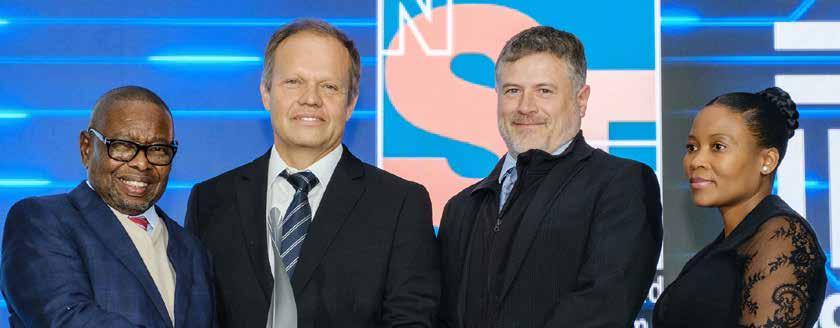
POTCheFSTrOOM-based Jonker Sailplanes has once again clinched the NSTF-South32 Innovation Award for Small, Medium and Micro enterprises (SMMes), cementing its position as a global leader in sailplane design and manufacturing.
This South African success story, born from a passion for aviation and engineering excellence, has revolutionised the world of competitive gliding and empowered scores of South Africans.
Founded in 2006 by Professor Attie Jonker, his brother Uys and Dr Johan Bosman, Jonker Sailplanes started as a small team of three engineers and three technicians. Today, it boasts a workforce of over 150, including 16 qualified engineers. About 90% of the staff joined as unskilled workers from the Ikageng Township near Potchefstroom; and today they are specialist technicians capable of performing safety-critical processes regulated by US and european aviation authorities.
The company’s journey to the top is marked by continuous innovation and a relentless pursuit of perfection. Its first plane, the JS1, became an immediate success, winning numerous national and international gliding competitions. Its successor, the JS3 glider, had advanced features and was developed over five years in collaboration with North-West University (NWU), where several PhD

Science, Technology and Innovation Minister, Dr Blade Nzimande together with Prof Attie Jonker and his brother Uys from Jonker Sailplanes, and a representative of the sponsor, NIPMO.
students conducted basic aerodynamic research under the stewardship of in-house experts at Jonker Sailplanes.
The JS3 glider first took to the skies in 2016 and is currently in serial production, with 220 units already delivered to customers throughout the world. Since its release, it has dominated international competitions – securing the top seven positions at the 2022 World Gliding Championships, with 70% of competitors in Jonkers Sailplanes.
The company also pioneered the development of Africa’s first electric propulsion aircraft, the JS3 reS, which features a retractable electrical propulsion system and the world’s first removable batteries in an electric glider.
Key to Jonker Sailplanes’ success is its strong collaboration with academia, particularly NWU’s School of Mechanical engineering. This partnership has developed focused research with direct industrial applications. Two of the company’s founders maintain active roles in both the business and academic spheres; ensuring a seamless flow of knowledge between research and practical application.
As Jonker Sailplanes continues to soar, it remains true to its vision of producing the world’s most sought-after gliders. With a blend of cutting-edge technology, academic collaboration and a passion for flight, this South African company is not just competing on the global stage – it’s dominating the race.



FOr her involvement in both communicating her own science to the public and training early career researchers in science communication, Professor Jennifer Fitchett won the Communication Award.
her research is situated within the discipline of biometeorology, exploring the impacts of climate change on both the natural environment and human populations. A Professor of Physical Geography in the School of Geography, Archaeology and environmental Studies (GAeS), Fitchett won the award for effectively communicating her science in an accessible way through a science blog, publishing articles in The Conversation Africa and podcasts.
“Science communication has always been an integral component to my scientific process. Communicating our work to a general audience requires us to think it through more thoroughly, and with a more critical eye,” says Fitchett. “Doing so effectively allows science to translate into action.”
In 2022, Fitchett was elected to the South African Young Academy of Science (SAYAS) and signed up to co-edit the blog. In teaching her honours students, Fitchett gives continuous assessment assignments where students produce weekly blog posts related to course content. This inspired several students to start their own blogs.
“It’s very exciting to work with a cohort of young scientists who want to have their voices heard,” she said.
Fitchett graduated with distinction from the University of the Witwatersrand (Wits) and then completed her PhD in Geography with a split-site component at both Wits and University College London. In 2016, she worked as a postdoctoral fellow at the Wits evolutionary Studies Institute, funded by the Department of Science and Innovation (DSI)/National research Foundation (NrF) Centre of excellence for Palaeosciences.
In 2017, she began lecturing at Wits and was promoted to Senior Lecturer in 2018. She became Associate Professor in 2019, full-time Professor in March 2023 and delivered
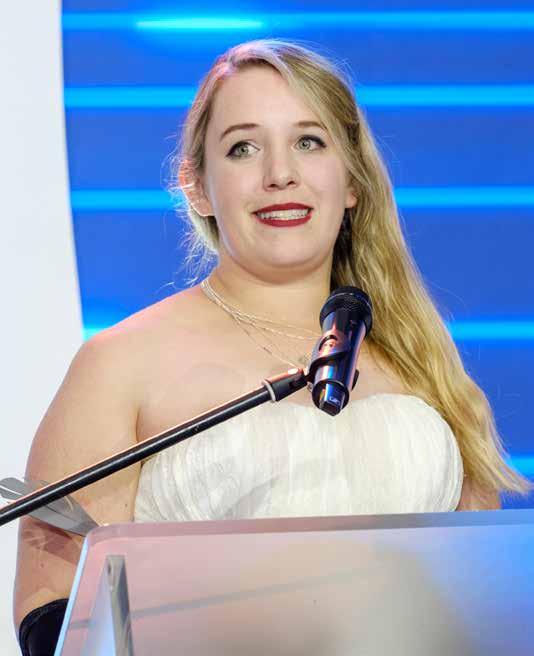
her inaugural lecture in July 2023.
Fitchett currently serves as the African Councillor of the International Society of Biometeorology, and is the President of the Society of South African Geographers. She is the Associate editor of the South African Journal of Science, and on the editorial board of the International Journal of Biometeorology, Environment and Planning F, The Holocene and Global and Planetary Change.




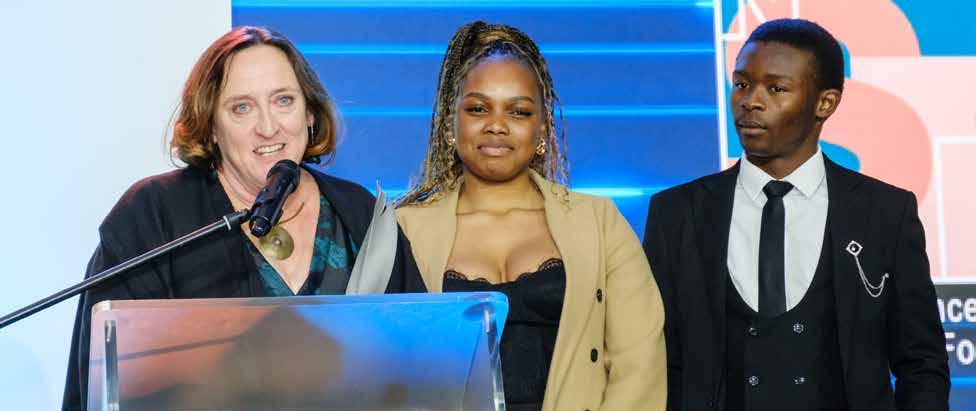
OLICO Mathematics education is a non-governmental organisation (NGO) that offers a variety of programmes supporting learners and teachers in mathematics, from grade r through to grade 12.
Dr Lynn Bowie is the Director of Mathematics at OLICO, a Visiting research Associate in the University of the Witwatersrand (Wits) School of education and a Wits alumna.
She is passionate about finding ways to improve maths education in South Africa. At OLICO, she has been involved in exploring the use of technology and innovative material to support mathematics learning – both in the after-school space as well as within schools.
“Across all our programmes at OLICO, we strive to offer a sense-making and confidence-building approach to make maths accessible, meaningful and enjoyable for all South African children,” says Bowie.
During lockdown in 2021, Bowie pioneered the OLICO/Two Minute Tango app, developed at Wits University, which helps young mathematics learners build confidence and competence in addition, subtraction,

multiplication and division.
Bowie says that OLICO is staffed largely by inspirational young people who go above and beyond when working with learners; sharing not only their mathematical knowledge but also expending an enormous amount of emotional energy to ensure learners remain motivated and have a safe and supportive space in which to learn.
“The NSTF-South32 award is a wonderful recognition of their work and commitment,” she says.
Bowie earned a PhD in Mathematics education in 2013. She has taught mathematics at all levels – primary school through to university mathematics – including teaching prospective and in-service mathematics teachers at Wits for several years before joining OLICO.
She says that OLICO values its association with the university. “We benefit from this through being able to link research with our practical experience on the ground, being able to draw on the knowledge of colleagues in the School of education, and because of the fact that a number of our teaching staff are drawn from the pool of talented Wits students and graduates.”



The Inter-University Institute for Data Intensive Astronomy (IDIA) has won the NSTF-South32 Special Annual Theme Award: Fourth Industrial revolution (4Ir) in South Africa, recognising its pioneering efforts in bridging astronomy and big data.
“Our goal is to build capacity and expertise in data intensive research and enable the SA research community to step forward as global leaders,” explains Prof rob Simmonds, Associate Director for New Technology Initiatives.
Born in 2015, IDIA is the brainchild of three local universities – the University of Cape Town, University of the Western Cape and University of Pretoria – alongside the South African radio Astronomy Observatory (SArAO). IDIA emerged as a collaborative effort in the face of the looming data deluge from projects like MeerKAT and the Square Kilometre Array (SKA).
At the heart of the work is ilifu, an advanced federated cloud infrastructure that has already served more than 400 astronomers and postgraduate students across 12 universities and four national facilities in SA alone. Since 2018, nearly 200 peer-reviewed articles incorporating its infrastructure have been published.
Project Manager Kechil Kirkham describes IDIA as an academic organisation that performs several functions.
“We nurture postgraduates so that they remain engaged and able to contribute to astronomical research. We also mentor software developers and support astronomers in processing their data.”
One of IDIA’s most significant contributions is the development of open-source software tools like CArTA (Cube Analysis and rendering Tool for Astronomy) and iDaVIe-v (immersive Data Visualisation Interactive explorer for volumetric rendering within Virtual reality), reshaping astronomical research and pushing the boundaries of data visualisation.
“Integration with virtual reality (Vr) software is an exciting avenue for visualisation software, which we are actively pursuing through the IDIA Visualisation Lab,” Kirkham says.
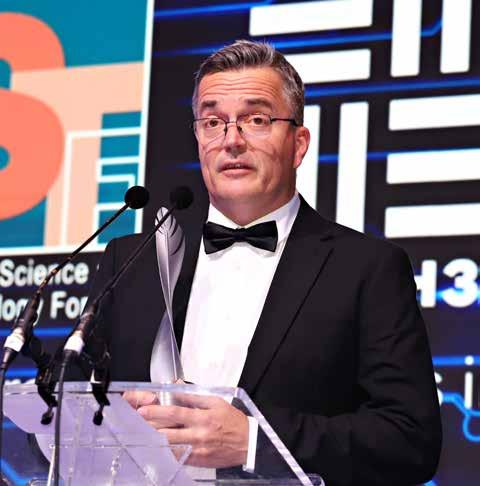
Associate Professor Sally Macfarlane, IDIA’s Associate Director for Development and Outreach, says the team is passionate about democratising science and inviting everyone to join the cosmic conversation. “Through innovative outreach programmes, we’re lowering the entry barrier for newcomers to cloud-based big data science, and fostering inclusivity in data science and computing projects.”
The IDIA team sees the NSTF-South32 Special Annual Theme Award: 4Ir in SA as recognition of past achievements and a catalyst for future innovation. “This is a pivotal moment, and we will leverage the publicity and recognition to drive our vision for the country forward –strengthening partnerships, building new collaborations and inspiring the next generation of IDIA’s infrastructure users.”



